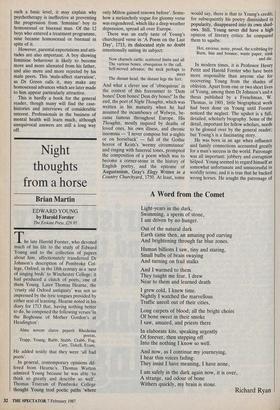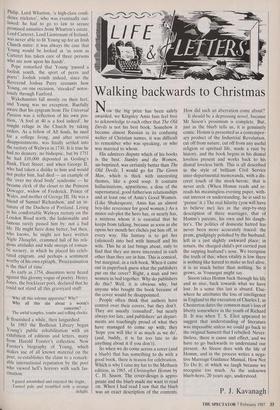Night thoughts from a horse
Brian Martin
EDWARD YOUNG by Harold Forster
The Erskine Press, £29.95
The late Harold Forster, who devoted much of his life to the study of Edward Young and to the collection of papers about him, affectionately transferred Dr Johnson's description of Pembroke Col- lege, Oxford, in the 18th century as a 'nest of singing birds' to Winchester College: it had produced a clutch of poets, one of them Young. Later Thomas Hearne, the 'crusty old Oxford antiquary' was not so impressed by the lyric tongues provided by either seat of learning. Hearne noted in his diary for 1713 that, having nothing better to do, he composed the following verses 'in the Boghouse of Mother Gordon's at Headington': Alma novem claros peperit Rhedicina poetas, Trapp, Young. Bubb, Stubb, Crabb, Fog, Cary, Tickell, Evans.
He added testily that they were 'all bad poets'.
In general, contemporary opinions dif- fered from Hearne's. Thomas Warton admired Young because he was able 'to think so greatly and describe so well'. Thomas Tristram of Pembroke College thought Young trod poetic paths 'where
only Milton gained renown before'. Some- how a melancholy vogue for gloomy verse was engendered, which like a deep weather depression, spread all over Europe.
There was an early taste of Young's churchyard verse in 'A Poem on the Last Day', 1713, its dislocated style no doubt intentionally suiting its subject:
Now charnels rattle: scattered limbs and all The various bones, obsequious to the call, Self-moved advance; the neck perhaps to meet The distant head, the distant legs the feet.
And what a clever use of 'obsequious' in the context of this forerunner to Dem bones! Dem bones! Dem dry bones!' In the end, the poet of Night Thoughts, which was written in his maturity when he had assumed the incumbency of Welwyn, be- came famous throughout Europe. His Thoughts, mostly inspired by deaths of loved ones, his own illness, and chronic insomnia — 'I never compose but a-nights or on horseback' — full of the Gothic horror of Keats's 'wormy circumstance' and ringing with funereal tones, prompted the composition of a poem which was to become a corner-stone in the history of English poetry, and the epitome of Augustanism, Gray's Elegy Written in a Country Churchyard, 1750. At least, some would say, there is that to Young's credit; for subsequently his poetry diminished in popularity, disappeared into its own shad- ows. Still, Young never did have a high opinion of literary critics: he compared them to squibs: Hot, envious, noisy, proud, the scribbling fry Burn, hiss and bounce, waste paper, stink
and die.
In modern times, it is Professor Henry Pettit and Harold Forster who have been more responsible than anyone else for recovering Young from the shades of oblivion. Apart from one or two short lives of Young, among them Dr Johnson's and a thesis published by a Frenchman, W. Thomas, in 1901, little biographical work had been done on Young until Forster noticed the neglect. The upshot is a full, detailed, scholarly biography. Some of the detail, important for fellow scholars, needs to be glossed over by the general reader; but Young's is a fascinating story.
He was born in an age when influence and family connections accounted greatly for a man's success in the world. Patronage was all important: jobbery and corruption helped. Young seemed to regard himself as somewhat unfortunate and unsuccessful in worldly terms; and it is true that he backed wrong horses. He sought the patronage of
Philip, Lord Wharton, 'a high-class confi- dence trickster', who was eventually out- lawed: he had to go to law to secure promised annuities from Wharton's estate. Lord Carteret, Lord Lieutenant of Ireland, was never able to fit Young up for an Irish Church mitre: it was always the case that Young would be looked at 'as soon as Carteret has taken care of three persons who are now upon his hands'.
Pope remarked that Young 'passed a foolish youth, the sport of peers and poets': foolish youth indeed, since the Reverend Joshua Parry recounts how Young, on one occasion, 'streaked' notor- iously through Fairford.
Wykehamists fall mostly on their feet; and Young was no exception. Ruefully aware that his epigram from The Universal Passion was a reflection of his own pos- ition, 'A fool at 40 is a fool indeed', he sought refuge in the Church by taking orders. As a fellow of All Souls, he sued for a college living, and after several disappointments, was finally settled into the rectory of Welwyn in 1730. It is true he had no deanery, no bishopric, but by 1751 he had £10,000 deposited in Gosling's Bank, Fleet Street, and when George II, who had taken a dislike to him and would not prefer him, had died — an example of the 'over my dead body' syndrome — he became clerk of the closet to the Princess Dowager, widow of Frederick, Prince of Wales, and mother of George III. He was a friend of Samuel Richardson, and an in- timate of the Duchess of Portland. Living in his comfortable Welwyn rectory on the London Road north, the fashionable and famous rarely passed him by: not a bad life. He might have done better, but then, who knows, he might not have written Night Thoughts, crammed full of his reli- gious attitudes and wide sweeps of roman- tic scenery, in which he placed his celeb- rated epigram, and perhaps a sentiment worthy of his own epitaph, 'Procrastination is the thief of time'.
As early as 1754, dissenters were heard against this gloomy vogue of poetry. Henry Jones, the bricklayer poet, declared that he could not stand all this graveyard stuff:
Why all this solemn apparatus? Why?
Why all this din about a worm's concerns? . . .
The awful temples, tombs and tolling clocks:
It flourished a while, then languished.
In 1983 the Bodleian Library began Young's public rehabilitation with an exhibition of editions and letters, many from Harold Forster's collection. Now Forster's biography of Young, which makes use of all known material on the poet, re-establishes the claim to a remark- able international reputation by the poet who viewed hell's horrors with such fas- cination:
I gazed astonished and enjoyed the fright, Turned pale and trembled with a strange
delight.



















































 Previous page
Previous page